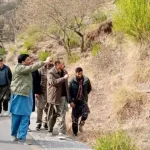ISLAMABAD: Concerned over militant attacks on Pakistani girls’ schools, the UN special rapporteurs have called on the government to protect women’s and girls’ fundamental right to a safe and secure education.
“The continuous terror assaults against girls’ schools by groups opposed to women’s and girls’ education worry us. In a letter to the Pakistani government, Farida Shaheed, special rapporteur on the right to education; Reem Alsalem, special rapporteur on violence against women and girls; and Laura Nyirinkindi, chair-rapporteur of the Working Group on discrimination against women and girls, wrote: “We note that all attacks on schools are abhorrent, but that targeted attacks against girls’ schools additionally deter women and girls from seeking an education, perpetuating discrimination and inequalities in society.”
They requested information from the government about the investigations and safeguards being put in place for Waziristan’s girls’ schools.
According to the three experts, girls in Pakistan are less likely to enroll in school, remain in school, and even if they do attend, they are less likely to meet learning objectives. In addition to having the worst educational outcomes, girls from rural areas are particularly vulnerable to sociocultural views and poverty, which hinder them from finishing their education.
Demand Idris Khattak’s unconditional and urgent release.
According to the experts, the net enrollment rate for girls in schools is generally lower than that for boys, and it is even worse in rural areas. They cited attacks on private girls’ schools in North and South Waziristan, as well as in the Surab district of Kalat division in Balochistan, by unidentified armed men carrying explosives.
In Pakistan, girls are disproportionately denied access to education, according to the letter. There are many obstacles to girls’ education, such as a dearth of schools, safety issues (such as harassment) when traveling to school, child marriages, and the exorbitant expense of education, particularly for low-income households.
The experts reminded the administration that nations are required by international human rights law to uphold, defend, and fulfill the fundamental freedoms and rights of women.
Freeing Idris Khattak
Separately, the Pakistani government has been urged by a panel of UN special rapporteurs on enforced disappearances to guarantee the unconditional and prompt release of human rights advocate Idris Khattak.
“We are dismayed by the continued apparent arbitrary deprivation of liberty of Mr. Khattak, which clearly appears to be a direct retaliation for his human rights work, including documenting and reporting on enforced disappearances and representation against ethnic minorities in Pakistan’s northwest region,” the human rights experts said in a joint statement released in Geneva on Monday.
Regarding Mr. Khattak’s situation, the specialists claim to be in communication with Pakistani authorities. In 2021, when a military court tried him, he was found guilty and given a 14-year prison term. They said that since being placed in military prison in November 2019, Mr. Khattak has reportedly endured a number of severe abuses and human rights breaches throughout the last five years.
UN experts urged Pakistan to guarantee an unbiased, independent, efficient, and comprehensive investigation into the abuses Mr. Khattak has endured, find the perpetrators, and prosecute them, particularly those at the command level. They called on the government to abide by the Supreme Court’s ruling that such trials are unlawful.








